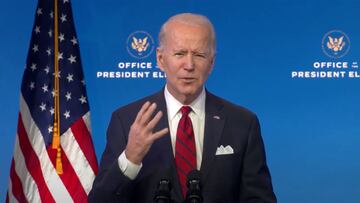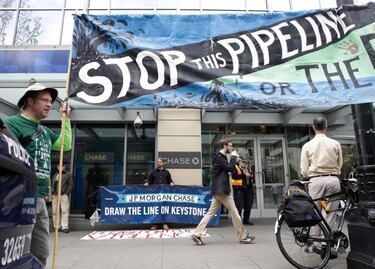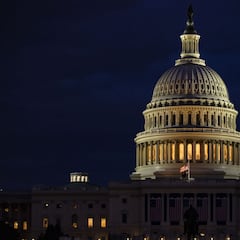What is the Keystone Pipeline XL and why would Biden cancel it?
President-elect Joe Biden looks set to sign an executive order to revoke the permit for the controverial Keystone Pipeline XL project that would carry oil from Canada to the US.

The inauguration of Joe Biden will usher in a sea-change in US environmental policy starting from day one.
The president-elect is set to sign several executive orders during his first few days in office, the most important of which will see the US rejoin the Paris Climate Agreement, reversing Donald Trump’s decision to pull the world’s second largest polluting nation out of the deal in 2017. (Although due to delays, the US only formally withdrew from the agreement in November, 2020).
Biden has promised to make the fight against climate change a top priority of his administration. And rejoining the Paris climate accord is not the only monumental environmental-based action that Biden is set to take during his first day in office.
According to reports of a briefing note seen by Canadian and US media, the incoming president will also sign an executive order to cancel the controversial Keystone XL Pipeline.
What is the Keystone XL Pipeline?
Keystone XL is a $8bn pipeline project that will carry oil from the Alberta oil sands in Canada to Steele City, Nebraska, stretching almost 1,200 miles and carrying some 830,000 barrels of oil each day. This would join the existing Keystone Pipeline, which already sends 550,000 barrels of oil per day to the US, but take a more direct route. Alberta-based energy company TransCanada and other oil shippers were set to finance the project that now looks set to be scrapped by the Biden administration.
Environmentalists and Native American groups have long been fighting against the project, with efforts seemingly coming to fruition in 2015 when former US president Barack Obama vetoed a bill approving its construction in 2015.
However, Obama’s successor, President Donald Trump overturned that decision in 2017, allowing work on the project to recommence. However, the decision is set to be reversed again by Biden, who, during the campaign trial, had pledged to “rip up” the oil pipeline’s Trump-backed permit if he became president.
- What is Joe Biden's plan for his first 10 days?
- What's the current minimum wage and what is Biden’s proposal?
- What executive orders will Joe Biden sign first?
Why is there opposition to Keystone Pipeline XL?
The project has attracted fierce global opposition on the grounds that extracting oil from the Alberta oil sands requires significantly more energy than traditional drilling, meaning that the amount of greenhouse gases emitted per barrel of oil from the oil sands can be as much as 30% higher, according to Green Peace.
Environmental groups have also pointed to the risk posed to local communities, with Environment Canada having discovered industry chemicals seeping into ground water and the Athabasca River.
Native American groups in the Northern Alberta region have already sued the provincial and federal governments for the damages caused by 15 years of oil sands development, claiming they had not been sufficiently consulted on the project. They also claim the project has been an infringement on their guaranteed rights to hunt, trap and fish on traditional lands.

Keystone Pipeline XL: Biden could face legal challenges
While news of the Biden administration’s plans will be warmly welcomed by environmentalists, native American groups and many green-minded voters on the left, the new US president could face opposition and legal challenges from those supporting the project, particularly from Canadian government leaders that have long been pushing for it.
Alberta Premier Jason Kenney stated he was "deeply concerned by reports that the incoming administration of President-elect Joe Biden may repeal the presidential permit for the Keystone XL border crossing next week.”
I am deeply concerned by reports that the incoming administration of President-elect Joe Biden may repeal the Presidential permit for the Keystone XL border crossing next week.
— Jason Kenney 🇺🇦 (@jkenney) January 18, 2021
My full statement: pic.twitter.com/vZjun1IdMH
Related stories
Mr. Kenney said cancelling the project would "kill jobs on both sides of the border" and "weaken the critically important US-Canada relationship", adding that his government would look at legal action if the pipeline permit is revoked for a second time.
Meanwhile, Canada’s US ambassador Kirsten Hillman has stated that she will continue to support the project, claiming it was in line with both countries’ environmental policies. “There is no better partner for the US on climate action than Canada as we work together for green transition,” Hillman said in a statement.

